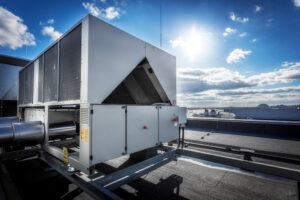
Understanding the Difference Between HVAC Service Companies and HVAC Mechanical Contractors

The terms “mechanical contractor” and “HVAC contractor” are often used interchangeably by building owners and maintenance professionals. However, these terms refer to distinct roles with specific responsibilities. Understanding the differences between these two types of contractors can help you make informed decisions about who to call for various services and repairs.
What Are Mechanical Contractors?
“Mechanical contractor” is a broad term that encompasses professionals who oversee the mechanical systems of buildings. These contractors work on a variety of systems, including refrigeration units, plumbing, electrical systems, and commercial heating.
Mechanical contractors are often involved in the design phase of building projects, working alongside architectural designers and engineers to create comprehensive plumbing and electrical schemes. They are responsible for installing these systems and ensuring they operate efficiently. When these systems require maintenance or repair, mechanical contractors step in to address the issues.
Most mechanical contractors have a specialty. For instance, some focus on commercial plumbing systems, installing pipes, tanks, water heaters, and sanitary lines. They also integrate new appliances, like water softeners, into existing systems. Others might specialize in refrigeration or electrical systems, tailoring their services to specific building needs.
What Are HVAC Contractors?
HVAC contractors are a specialized subset of mechanical contractors. Their focus is on Heating, Ventilation, and Air Conditioning (HVAC) systems. They install, repair, and maintain HVAC equipment, ensuring that buildings have reliable and efficient temperature control.
In a commercial setting, HVAC contractors work with more than just furnaces and air conditioning units. They also install ventilation equipment, such as central fans and dehumidifiers, and maintain heat pumps, which are increasingly common. HVAC contractors ensure that these systems operate smoothly and meet the specific climate control needs of the building.
You might encounter the term “HVAC mechanical contractor,” which is synonymous with “HVAC contractor.” This term emphasizes that these professionals are part of the broader mechanical contracting field but with a specific focus on HVAC systems.
Who Should You Call?
Understanding who to call for various issues is crucial for maintaining the functionality of your building’s systems:
- For heating, cooling, or ventilation problems, contact an HVAC mechanical contractor. You should also call an HVAC contractor if you’re unhappy with the temperature or humidity regulation in your space. They can diagnose issues with your HVAC systems, recommend upgrades, and ensure optimal climate control.
- For electrical issues, you should call an electrician or electrical contractor. These professionals specialize in electrical systems and can handle everything from wiring to electrical panel upgrades.
- For plumbing problems, call a plumber or a mechanical contractor who specializes in plumbing. They can address issues with pipes, water heaters, and other plumbing-related systems.
Some mechanical contracting companies offer a range of services, including HVAC, plumbing, and electrical work. If you contact a company that doesn’t provide the specific service you need, they can often refer you to a trusted specialist.
Conclusion
Understanding the distinction between mechanical contractors and HVAC contractors helps in addressing building maintenance and repair needs efficiently. Mechanical contractors cover a broad spectrum of systems, including HVAC, plumbing, and electrical, while HVAC contractors focus specifically on heating, cooling, and ventilation. Knowing who to call for specific issues ensures that your building’s systems are maintained and repaired by the right professionals.
If you are looking to sell vour HVAC service company or buy an HVAC company, LVGAdvisors.com is your top choice. Our business broker team specializes in construction companies, including HVAC, plumbing, electrical, environmental, roofing, refrigerant processing, door and window companies, and more. We seek clients with sales generally between $2,000,000 and $50,000,000, with operations spanning several years. Contact us today to learn how we can help you with your business transition needs.
